New Security Council Members (and a Discussion Question)
Should the UN expand the number of permanent Security Council members?
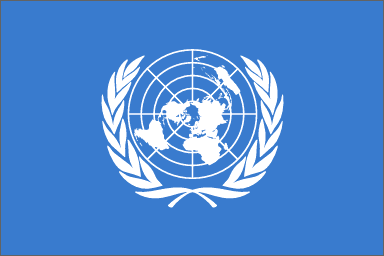 Via the BBC: Five new members voted on to UN Security Council
Via the BBC: Five new members voted on to UN Security Council
The five new members: Germany, India, South Africa, Colombia and Portugal.
These are, obviously, for the non-permanent seats (two year terms).
Question for discussion: should the number of permanent seats on the Security Council be expanded? As the story notes:
Brazil, Germany, India and Japan have all argued that they should have a permanent seat on the council.
There is something to the notion that the Security Council’s current permanent membership is an anachronism. Specifically the permanent members go their seats by being the victors in WWII: China, Britain, France, the US and Russia.
Thoughts?

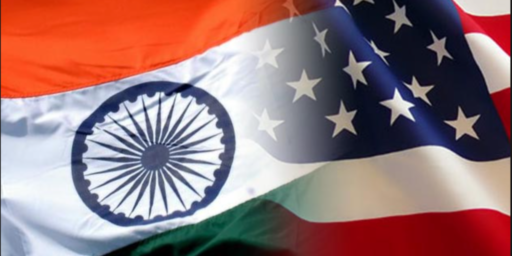
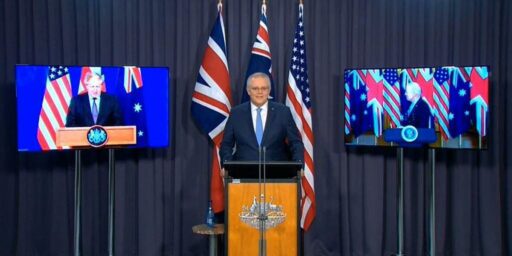
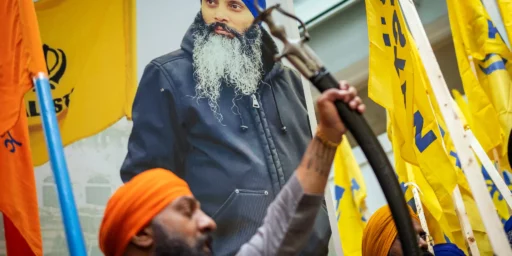
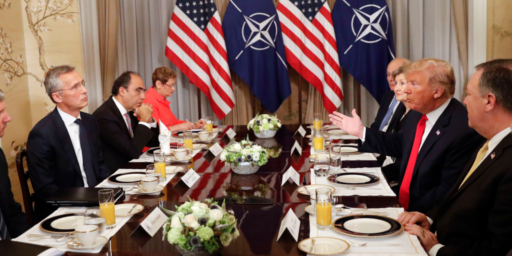

I don’t have any problem with expansion, but I think as a practical matter it would take a war to create the concensus needed fot it to happen. Brazil is not a great power, and there are certainly a few other Latin American countries that might feel close enough in power to challenge the assignment of the “Latin American” permanent seat. I also wonder how the Islamic world would react to an Indian seat, or maybe even the Far East as to Japan.
I addressed this a couple years back in a post titled “Expand the Security Council? Non. The G8? Oui.”
The key bits:
That pretty much sums it up.
If it was put to a vote, I would vote for Germany and Japan, on the condition that the Japanese Consitution be revised. Is this consistent with the role and purpose of the Security Council:
“Japanese people forever renounce war as a sovereign right of the nation and the threat or use of force as means of settling international disputes”
?
James Joyner says:
Tuesday, October 12, 2010 at 14:54
“I addressed this a couple years back in a post titled “Expand the Security Council? Non.”
You’re spitting in the wind Jim. It’s inevitable if the UN is going to remain relevant. Institutions that don’t change to reflect power realities inevitably atrophy. India, Brazil, Indonesia, Pakistan, Japan aren’t going to remain relegated on the sidelines forever and if the victor powers of WW 2 try to keep it this way all that will happen is that these countries will establish alternative centers of power. It’s the sort of resistance to change you advocate that is largely responsible for the decline of US influence in the OAS. As the discussion on the NATO the other day demonstrated you seem to think we can preserve the WW 2/Cold War power structure indefinitely and it’s impossible.
Why pick countries based on power? Let’s reward countries for good behavior. How about Costa Rica, Norway or Switzerland? Or we could go with ‘most improved’ and give seats to Cambodia or Uganda. I favor creation of a Council of the Helpless with seats for Liechtenstein, Benin, Singapore and of course, Canada.
I´m a Brazilian, and the problem of giving Brazil a seat in the Security Council is that our diplomacy has no idea about what they are doing. They want to end the conflict in Palestine while they ignore the problems of our neighbors. Another problem is that the country has a very, very poor Armed Forces.
Besides that, giving the veto power to a few countries, while giving the same one vote to all countries, regardless of their populations, is a bad policy.
“I´m a Brazilian, and the problem of giving Brazil a seat in the Security Council is that our diplomacy has no idea about what they are doing. ”
I don’t suppose Mr Lula would agree with you. But even if you’re correct, having no idea what you’re doing isn’t unique to Brazil. The US had no idea of what it was doing for most of the 8 years from 2001 to 2008
I, too, wrote quite a bit on this subject (about six years ago). See here. I think the question is less why Germany, Brazil, India, and Japan aren’t permanent veto-wielding members of the UNSC but why China and France are.
My opinion on expanding the Security Council is that the conditions for becoming a veto-wielding member of the UNSC should be formal and open, that such membership should be automatic upon achieving such conditions, and loss of membership, too, should be automatic if a country should cease to satisfy the conditions of membership.
One thing that might cast some light on the question is if we consider the permanent UNSC members to be a security producing contingent. Brazil, for example, is not a security producer. It’s a consumer.
Expand the U.N.? I was hoping to disband that gang of pukes!
“and loss of membership, too, should be automatic if a country should cease to satisfy the conditions of membership.”
What do you think the UN is Dave, Rotary or the boy scouts? The persistence in viewing this through an entirely US prism has no bearing on the realities of world power today let alone in fifty years time or even 10-20 years.
“I don’t suppose Mr Lula would agree with you.”
He does not(And I voted for him and I´m going to vote for his successor). But any impartial observer can see that there are problems with the Brazilian Foreign Policy. There was that Honduras Fiasco, the Iranian Fiasco, and so on. Another problem that no one notes is that Brazil is a neighbor of very unstable countries(Venezuela, Colombia, Ecuador, Bolivia, Paraguay) and very few people inside Brazil cares about that. Very few people are worried about the Mexican Cartels, that could be creating operations in South America(It´s true, with the exception of anti-immigration people few Americans care about the cartel)
It´s a very isolationist country, in the bad and in the good sense of the word, while wants to play superpower.
” But even if you’re correct, having no idea what you’re doing isn’t unique to Brazil. The US had no idea of what it was doing for most of the 8 years from 2001 to 2008″
Well, the US at least has a considerable Armed Forces. Brazil does not have(I saw then staging a military exercise once). Most of the infantry divisions are poor, there is a lack of proper vehicles and equipment to large scale war. They may do the work to frighten drug gangs in Rio de Janeiro to stage an international event or to do some patrolling in Haiti, but nothing more than that.
No, I think it’s supposed to be a security-producing institution. We already have a General Assembly that’s representative. There’s no need for a second general assembly.
Does adding countries like Brazil that have no ability to project power beyond their borders further the security-producing role of the permanent members Security Council? Does limiting the club of permanent members to the World War II Allies?
Dave, do you think Japan’s Consitution is inconsistent with the task of being a permanent member of the Security Council? (I say this knowing Japan has been a non-permanent member, but I think the roles of each differ)
“Brazil, for example, is not a security producer. It’s a consumer.”
What do you mean by this?
André Kenji says:
Tuesday, October 12, 2010 at 17:56
“It´s a very isolationist country, in the bad and in the good sense of the word, while wants to play superpower. ”
China is a very isolationist country. 25 years ago both Brazil and China were next to being third world countries. They are both emerging on the world stage which isn’t a tidey process. The notion that the country that is clearly going to be the dominant power in the southern western hemisphere is going to take a back seat in international affairs is both naive and illogical. I don’t see much logic either in a vote for Lula but not one for his successor who is essentially a clone and where he’s likely to be doing some back seat driving.
Dave Schuler says:
Tuesday, October 12, 2010 at 18:33
“Does adding countries like Brazil that have no ability to project power beyond their borders further the security-producing role of the permanent members Security Council?”
It’s clear you don’t have too much understanding of the importance of soft power when as the events of the past ten years should demonstrate hard power can get you into all kinds of trouble. And it might be a good idea if you had a somewhat longer time frame. China, Brazil and India today don’t look remotely like they did 25 years ago and so what are they going to look like in another 25 years. You seem completely imprisoned in that US prism I mentioned.
“China is a very isolationist country. 25 years ago both Brazil and China were next to being t
third world countries. They are both emerging on the world stage which isn’t a tidey process. ”
No, that´s different.The Chinese may be politically isolationist (The Africans may disagree), but they have elites that are interested about what happens in the West. There are several CNN International shows aimed for Chinese audiences, even under Communist rule. Comparing to the Asian middle classes there are very few people that speaks English. Any Brazilian newspaper has a very poor international coverage.
It´s true, Brazil is not a country that should be ignored in economic terms – just ask the people in Saint Louis. But it´s much more like a poor cousin of the United States than China, and it´s a country without a international presence or military capability Most Brazilians that Americans know personally are these New Jersey Plumbers that does not speak English. The Spelling Bee is beggining to looks like a phonebook of Mumbai, there are several of them at American Universities.
“I don’t see much logic either in a vote for Lula but not one for his successor who is essentially a clone and where he’s likely to be doing some back seat driving.”
I´m going to vote for his successor(Oh, yes, sometimes I´m not so clear while writing in English). But I´m not going to vote without any criticism for them.
Better the devil you know!
No, unfortunately, I know well her opponent. He allowed the crime to go rampant as governor(There was that scene of cops beating each other in São Paulo), his education policies are terrible.
Andre Kenji says:
Wednesday, October 13, 2010 at 10:29
Glad we got that straitened out on Lula’s successor. I do think you’re ignoring the nature of power and taking a short term view but I guess we’ll see over the next 25 years. Brazil’s rise is not inevitable but it’s likely.
Not really, because in Brazil the Congress is very powerful(It was in fact a Congress designed for a Parliamentary system and it´s a Congress even more skewed in favor of less populated and more conservative states than in the US). Besides that, no one with that record as a governor of a state should be rewarded with the presidency.
Brazil has a bright future, but it has several problems: it has the worst transportation structure among the emergent countries, it has pretty bad educational levels, it has a pension system waiting to blow up. It´s much more like a emergent version of the United States than India or China, the real countries of the future.
Andre Kenji says:
Thursday, October 14, 2010 at 11:30
“It´s much more like a emergent version of the United States than India or China, the real countries of the future.”
The notion that Brazil is in worse shape than India I find problematic if not bizarre.
“The notion that Brazil is in worse shape than India I find problematic if not bizarre.”
India was a miserable nation(Sub-Saharan African levels) some years ago, and it´s developing fast. It has the wonderful problem of preparing too much Information Technology people and engineers every year, Infosys and Tata Group were created there(And soon Tata Motors will be the next pain in the ass of Detroit). It has problems, but on the same time has a very low level of public debt, and a very promising future.
Brazil is not a small fish in the world´s economy: it has a very advanced agricultural sector, one of the most advanced in the world, it has big industrial companies, like Vale, Embraer, Petrobras, and so on; But it has it´s own problems that will have to face in the future: an unsustainable pension system, high levels of public debt, the worst tax system in the developing world and so on. But India is growing to be a even bigger fish.
“But it has it´s own problems that will have to face in the future: ”
India’s problems are considerably greater than those of Brazil which don’t begin to compare in complexity. Since she has a population of around a billion while Brazil’s is only 200 million, obviously India is ultimately going to be a bigger fish but that doesn’t mean that Brazil isn’t going to a fairly large one too. I don’t understand your negativity about Brazil which is clearly going to be a major world power in 50 years time. This is well nigh inevitable.
India is building a better transportation structure, it has pretty good educational levels on the middle class, it has a pretty good fiscal picture. I´m not downplaying Brazil: I´m being realistic: I live in Brazil. 😉